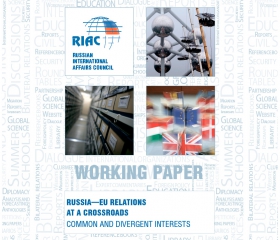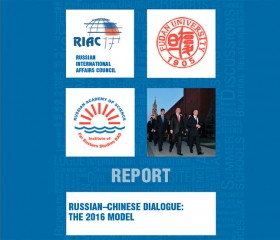2017 Foreign Policy Outlook
(no votes) |
(0 votes) |
PhD in Political Science, Director General of the Russian International Affairs Council, RIAC member
Most foreign policy forecasts open with statements about the uncertainty of the international situation. This is a convenient starting point, as it allows the analyst to hide behind and avoid taking responsibility for his or her forecasts. But if we really want to get an idea about what might await us in the future, we have to understand the “corridors of certainty”, which are visible for 2017. They are far from rosy and speak about the necessity to develop fundamentally new solutions to the accumulated problems.
Most foreign policy forecasts open with statements about the uncertainty of the international situation. This is a convenient starting point, as it allows the analyst to hide behind and avoid taking responsibility for his or her forecasts. But if we really want to get an idea about what might await us in the future, we have to understand the “corridors of certainty”, which are visible for 2017. They are far from rosy and speak about the necessity to develop fundamentally new solutions to the accumulated problems.
Where Does the Power Come From?
It is quite obvious that the tone of Russia’s foreign policy in 2017 will be dictated by the country’s relations with the United States. Donald Trump’s victory in the U.S. general elections is an important factor, but it is by far not the only one. The US plays the key role in resolving all issues connected with European security. Without the US, European countries cannot make a single decision of strategic significance. And the political turbulence in Europe only strengthens the role of that country. What is more, the tangle of contradictions with regard to European security is so messy that a single “deal” or new reset would not solve the problem. The situation is aggravated by the actions of the outgoing U.S. administration, which is actively trying to push relations with Russia towards the point of no return.
The new President of the United States will be forced to start from the existing legal framework and precedents in Russia-US relations. But Donald Trump has already demonstrated his ability to break the mould. It is entirely possible that he could embark upon a path towards a complete revision of Russia-US relations, with entirely pragmatic goals. Under the Obama administration, the United States lost Russia for good. Now, the Russian government is not only hostile towards the United States, but it is also leaning towards closer cooperation with Beijing. Trump views China as a strategic challenge. After all, it will be extremely difficult for the United States to keep hold of its international dominance if the number of allies — or at least neutral states — that it has with regard to the Asia Pacific continues to decrease.
One can blame all they want “revenge-seeking” for the collapse of US–Russia relations. To be sure, Moscow is not the easiest of partners. For the West, Russia’s strategic goals are not entirely clear. The Kremlin is following a rather tough policy, demanding that its interests be taken into account. But facts are facts. Under the previous administration, Washington failed to draw Moscow into an effective, predictable and mutually attractive model of relations. What is more, this failure of American diplomacy goes well beyond the limits of bilateral relations with Russia. Essentially, the Americans have failed as the leader of a unipolar world. After all, being a leader involves much more than accumulating aircraft carriers and warheads. At the heart of the very idea of being a leader is the ability to engage others in your system of values, beliefs, goals, institutions and models. And the fact that Moscow (among countless others) does not accept that system is another problem of the US. Sanctions cannot bring Russia round to their way of thinking. Moreover, they only strengthen the Kremlin’s determination to follow its own path. The window of opportunity for “accommodating” Russia, socializing it and turning into a partner (albeit a special partner) and ally of the United States has slammed shut. And all of this despite the fact that it was wide open 15 years ago. The loss of Russia is the major diplomatic and ideological defeat for the United States since the end of the Cold War.
The rift between Russia and the United States could have severe consequences in terms of international security. The risks of escalation increase as a result of incidents in zones where Russian and NATO forces are both engaged, as well as in response to local conflicts. Strategic stability — the predictable system of the balance and control of nuclear arms — is under threat of destruction. This is where we come to the unresolved problem of missile defence, the Intermediate Range Nuclear Forces Treaty that is falling apart before our very eyes, and the uncertain prospects with regard to the extension of the New START (Strategic Arms Reduction Treaty). The mechanisms of cooperation for combating new challenges are fading into the distance. (Obama’s cyber-sanctions are a perfect illustration of the situation.) The bottom line is that the risk of an intentional or unintentional direct military confrontation between Russia and the United States is growing at an alarming rate. A local skirmish could very well turn into a full-scale conflict. For understandable reasons none of Russia, the United States and European Union is interested in this.
All this sets an important agenda for the Russia–United States dialogue. The next and most urgent task is to minimize the damage that has already been done, as well as to work together to control the risks of escalation and reverse the violent downward trend.
Having a new administration opens is an opportunity for such dialog. However, it is necessary to understand the risks involved. The first problem is the fact that the new President of the United States could be disappointed with the process of normalizing relations with Russia. And the conditions exist for this to happen. The nature of the problems that exist in relations between Russia and the United States is such that painstaking and consistent work will be required to fix them. And it cannot be done overnight. It is a process, rather than a one-time solution. A marathon that at times will nevertheless require faster work. Are the leaders of Russia and the United States ready for the long haul? Are they prepared to send all the right signals to each other — signals that will come at a heavy price? After all, it is far more difficult to work to normalize relations than it is to capitulate and get caught up in a conflict.
It is entirely possible that the first friendly gestures (if any are made) could be followed by disappointment and the temptation to follow an even more hard-nosed policy. The American side is likely to act in this manner: they enjoy overwhelming superiority and have a much larger safety buffer, meaning that they have greater room for manoeuvre. The desire to “turn the screw” as far as it will go may very well prevail. Unlike Beijing, Moscow can do very little from a tactical point of view to hurt the United States outside of the very limited range of security issues. This makes Moscow a convenient target. The fact that this would weaken America itself may be ignored in favour of dealing with tactical tasks.
It would be in Russia’s best interests to take advantage of the opportunity to normalize relations with the United States. In order for this to happen, it is necessary for the sides to react calmly and with restraint to steps that may be considered unfriendly, as well as to turn the heat down on the information war that is currently being waged by both sides. Vladimir Putin’s decision to not reciprocate to the expulsion of Russian diplomats from the United States is a step in the right direction. It also confirms that the Russian leader is capable of breaking the mould as well. It may be useful to translate the US–Russia dialogue into the language of accounting: balancing what is in Russia’s interests; determining what the country will gain and lose in the event of a confrontation; deciding what exactly steps need to be taken in terms of common interests. We need a rational dialogue.
Selective Engagement

Igor Ivanov:
Russia and the United States Have to Get Back
to Constructive Dialogue
Russia–United States relations also influence those between Russia and the European Union. There are driving forces here too, however. There are two possible development scenarios for 2017: 1) the status quo will be maintained, with the sanctions regime continuing and the political positions adopted by the sides remaining the same; or 2) the situation will get even worse. Unfortunately, we are unlikely to see the sides softening their positions. Having said this, maintaining the status quo will be an achievement in itself. Business has adapted to the new atmosphere in relations. It is extremely important that we do not experience any new shocks, given the economic interdependence of the two countries.
An important task in relations with the European Union is to take advantage of the loopholes that have been incorporated into the new doctrinal principles of relations with Russia to move the situation towards normalization. For example, the content of the so-called “selective engagement” (one of Federica Mogherini’s five guiding principles) with Russia is by no means clear. It is possible that it could be the same old forms of relations to which we have long since grown accustomed. It could, however, include everything that has been achieved over the past 20 years. It may seem, for example, that the four common spaces diplomats agreed on during Igor Ivanov’s time as Minister of Foreign Affairs of the Russian Federation are impracticable. However, at its heart, this approach is entirely compatible with the “selective engagement” principle. Filling it with real projects, or promoting the development of common standards and rules will lay the foundations for the qualitative improvement of relations.
Another opportunity that has been largely underestimated is cooperation between the European Union and the Eurasian Economic Union (EAEU). There are both objective and subjective obstacles here. One of the objective obstacles is the difference in the levels of development of the two organizations. The European Union has long since turned into a political institution. The EAEU, on the other hand, positions itself as an apolitical and purely economic integration bloc. The structure of the EU and EAEU countries’ economies and the level of their development are extremely different, although the experience of the European Union was widely used when setting up the Eurasian integration project.
Subjective obstacles involve political differences between Moscow and Brussels. On the whole, the European Union sees the EAEU as a political bloc, almost as an attempt by Russia to recreate the Soviet Union. Those who would like to impede Eurasian integration have influential posts in Brussels. The sanctions regime provides the ideal conditions for this — the sanctions influence the relations between the members of the EAEU, and they force them to build relations with the European Union on a bilateral basis, bypassing the European Commission. While this is not fatal, it is painful. By keeping the sanctions regime in place, the European Union eliminates the possibility of cooperation with the EAEU. We should not expect a breakthrough on this front in 2017. But it is vital to develop possible ways to work together at the expert level and lay down the groundwork for the future.
Of course, the new balance of power that will emerge in the European Union following elections in a number of countries will be very important. Many of these elections will go beyond the purely national agendas and will essentially amount to votes of confidence in the European Union. Not that this is likely to change the structure of relations that has developed with Russia. But it will most definitely influence the future of the European integration.
Russia still has the traditionally powerful instrument of European politics at its disposal, that is, constructive relations with key European capitals — Berlin, Rome and Paris. 2017 will mark the 300th anniversary of diplomatic relations between Russia and France. That is as good a reason as any to take stock and coordinate plans for the future.
Homework
Eurasian economic integration is an important aspect of Russia–China relations. The coming year could prove to be a serious challenge in terms of the integration of the EAEU and the “One Belt, One Road” projects. The integration project was initiated in 2015 to much pomp and circumstance. Last year was spent doing all the necessary “homework.” Now it is time to show some real results. It is the moment of truth, as many influential people are skeptical about the project both in Beijing and the EAEU capitals. Concrete results could include joint projects between major companies, infrastructural plans, and movement towards the creation of an EAEU–China trade regime. Most probably, we will also see the weak sides of the integration project in 2017: the low level of participation in the project of small and medium-sized businesses; an imbalance in the political and economic components of the project; markedly different approaches to regulating trade; and the vulnerability of the EAEU economic zone. The goal for this year and beyond is to minimize these costs.
Security will become an increasingly important part of Russia–China relations in 2017. China’s relations with the new U.S. administration, as well as other regional players’ policies, are serious risk factors in this respect. Japan will continue the course of gradually increasing its independence. North Korea’s nuclear policy is an additional destabilizing factor. The situation here will not improve, and the development of regional missile defence in South Korea will affect strategic stability in Northeast Asia. Russia and China will maintain a cautious attitude towards the situation. Moscow and Beijing will work more closely to coordinate their positions. What is more, Russia and China will consistently align their approaches to issues on the global agenda. There is no reason to expect rapid movement towards the creation of a full-fledged union between the two countries. But even now, Russia–China relations force Washington into a situation of dual containment.
Beijing has the upper hand in the Russia — China — United States triangle. The Americans will have to either accept the fact that the Chinese agenda will gradually spread through the region, or take drastic political steps, going short in its relations with China. Such a situation is highly likely. But even the hot-tempered Donald Trump and his administration will realize the price of such a step. Whatever the political landscape, the regional arms race will gradually gain momentum.
Russia’s relations with Japan will play an important role here. President Putin’s visit to the country in December of last year was full of positive results. There were signs that progress could be made with regard to the territorial dispute. However, the energy of these achievements is likely to die down somewhat in 2017. Breakthroughs in terms of economic cooperation or the territorial issue are unlikely. Having said that, even the smallest growth in economic cooperation with Japan is important for Russia is terms of diversifying its ties in the Asia Pacific Region.
2017 will mark the 70th anniversary of mutual relations between Russia and India. This symbolic occasion created the perfect opportunity to carry out a thorough revision of bilateral ties between the two countries. Both Moscow and New Delhi value their strategic partnership. But new sources of interaction beyond military-technical cooperation and the peaceful use of nuclear technology are needed. Moreover, cooperation in these spheres is not exactly going smoothly. Now is not the time for the Russian side to rest on its laurels. A paradigm shift is required in Russia–India relations — from major projects to the creation of a favourable environment for small and medium-sized businesses, universities, the media and a wide range on non-governmental organizations. Moscow has a list of “homework assignments” for its relations with India that must been handed in for marking in 2017.
Surprises in the Middle East
Late 2016 brought a number of surprises in the Middle East. With the help of Russia, the Syrian forces recaptured Aleppo. Russia, Turkey and Iran coordinated their efforts with regard to the resolution of the situation in Syria. The resolution proposed by Moscow and Ankara was unanimously supported by the UN Security Council. The idea to hold negotiations in Astana, Kazakhstan, was also supported. It was the first time in several decades that the United States and the West had been forced to play a supporting role, which only a few months ago would have seemed like some kind of science fiction. A new reality is being formed in the Middle East. Non-Western systems of power are being built, systems which can restore order and combat terrorism. Neither the assignation of the Russian ambassador in Ankara nor other provocations have been able to reverse this trend.
This new configuration will be tested in 2017. The question is how strong the cooperation between Moscow, Ankara and Tehran will be. Not only this, but how effective will the ceasefire prove to be? The future of Syrian statehood should begin taking shape in the coming year. It would seem that we are moving towards the federalization of the country, with each federation being under the patronized by one of the players, who will also act as guarantors of the status quo. This might not be the best option for Bashar al-Assad, but it would offer him a necessary break. Then he will be able to focus his efforts on the fight against radical Islamists. Though, victory is unlikely in this case.
The political situation in Turkey will be an important factor. A shift is taking place in Ankara’s politics, with the country striving to play an independent role in the region and distancing itself from the European project, thus increasing its leverage in Brussels. This process will be closely linked with transformations taking place inside the country and with the consolidation of the current powers. The “value of shares” in Russia–Turkey relations will grow.
By acting as a guarantor of the settlement of the Syrian conflict, Moscow will consolidate its role in the region, where it will have a long-lasting presence.
Black Swans
An inevitable characteristic of the future is the fact that it is full of events that are extremely difficult to predict. The question is what repercussions these events will have, and whether or not they will have fundamental, qualitative and irreversible consequences. Or will it all be fluff without any real catastrophic effects? The conditions are ripe for Black Swans to appear. Crossing the red lines, violating established traditions, provoking escalations — all this has become the norm in international relations today. Clashes between Russian and NATO fighter jets. Large-scale terrorist attacks and (anti-)migration rallies in Europe. Assassinations. Incidents in Syria and the Middle East. Subversive actions in Donbass. Tensions in the South China Sea. Unexpected election results. Volatility on the commodities and financial markets. Coups and regime changes. In this inevitable succession of events, we have to keep in mind that we need foreign policy to resolve our own domestic issues. One hundred years ago the world was subjected to a huge catastrophe. And we need to learn from this.
First published in Russian in Expert.ru
(no votes) |
(0 votes) |








